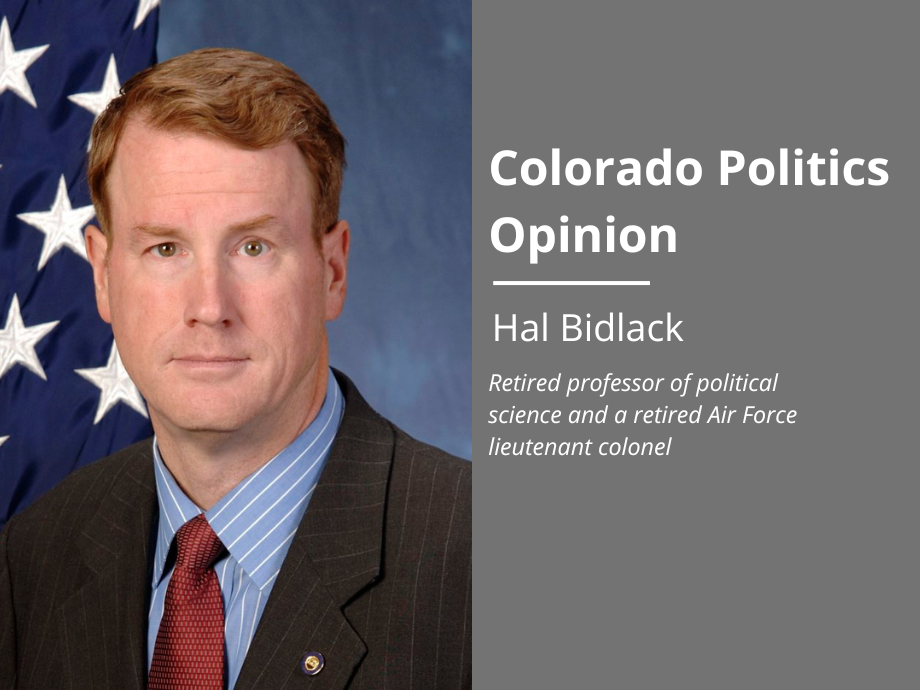For 2024, yet again, money is the measure | BIDLACK


Back during my unsuccessful run for the U.S. Congress in 2008 from Colorado’s 5th District, I was told by campaign experts I must, very quickly, raise an amount of money sufficient to demonstrate I was a “serious” candidate and not one running as a place holder or as a symbolic candidate. Raise $100,000 by the end of your first quarter of campaigning, I was told, and you will get attention.
Well, it was tough. I called 100 people a day, but when the time came to file the FEC report, I was able to report having raised $104,000, which did get me a front-page note on The Gazette and at least some credibility among the wealthy “donor class” that tend to fund campaigns, or at least large portions of them.
I was reminded of my long-ago dialing for dollars by a Colorado Politics story this week. As reported, Democratic candidates are doing quite well in fundraising, which is great news to me, but the level of money they have raised, and continue to raise, signals yet again the degree to which campaigns must find the money first and the ideas and policy proposals come later.
One thing to note in the 2024 election cycle – which we are now well into – is the length of time today’s candidates must actively run for office. In 2008, I formally declared for congress on April 2, 2008. I wanted to pick a day after the previous 3-month Federal Elections Commission (FEC) reporting period, so I wouldn’t have to file a report for the first three months of the year and I thought announcing on April Fool’s Day wasn’t optimum either. So I declared on April 2.
Amusingly though, I had opened a campaign bank account in March, with a deposit of $60, which is all I had in my wallet that day, as a place holder. Later, I realized by opening that account I turned on FEC attention to my campaign, and I had to file a first-quarter report, in which I had to say I raised $60 over three months, causing some local media to announce my utter failure as a candidate.
But I digress….
Still, I thought I had plenty of time, with all of April through October and the first three days of November to campaign. It felt like plenty of time. Today’s candidates, however, seem to be in near-perpetual campaign mode. Adam Frisch, the Aspen Democrat who came within a whisker of defeating our ongoing national embarrassment U.S. Rep. Lauren Boebert in the last election has basically been campaigning – and fundraising – since losing in 2022, and that, unfortunately, seems to be what one must do in today’s political climate. There are already four challengers to Boebert, with Frisch as the perceived front-runner, and the other three have been at it for months as well.
Which begs the question, when is the “correct” time to formally run for office? One answer is before anyone else declares, in hopes of scaring off any additional challengers in your own party. But that isn’t the case in Colorado so far. As a result, the candidates must start earlier and earlier and that also means they must raise lots of additional money during the longer campaign season. I’m not sure this is a good thing, and it is certainly not happening only in Colorado. Do you recall a certain former president, now under multiple indictments, filed his reelection paperwork with the FEC on his inauguration day? Talk about getting ahead of the game.
I would frankly hate to have to be a congressional candidate for basically two solid years, which appears to be the current requirement. Heck, my seven-month campaign was utterly exhausting. But that seems to be the reality of our current political climate.
Stay up to speed: Sign-up for daily opinion in your inbox Monday-Friday
And I will admit having candidates in the fight for months does allow some analysis based on their fundraising, especially for incumbents. Frisch is the champion of Colorado congressional fundraising, raising more than $3 million in the third quarter, a staggering amount of money. My entire campaign raised a bit over a quarter-of-a-million dollars. Combined with the other three Dems running in CD3, the Dems have raised $5 million to defeat Boebert. As reported by CoPo, that amounts to more than 75% of all congressional monies raised in Colorado during the third quarter.
The situation changes if you are the incumbent. Assuming you don’t have a primary challenger (somewhere U.S. Rep. Doug Lamborn, the oft-primaried incumbent who beat me, is rolling his eyes), you try to raise as much as you can for a couple of reasons. Certainly, you want to get as much funding as possible to get you on TV and radio as soon as possible and as widely as you can afford. But a huge war chest can also serve as a deterrent to both primary challengers and, frankly, general-election challengers. Joe Neguse, who represents the 2nd Congressional District for Colorado in U.S. Congress, has just under $2 million in the bank, in a district widely seen as solidly Democratic. A challenger, be it in the primary or the general, may well think carefully about challenging an incumbent with that level of resources a year out from election day. My old friend and terrific guy. U.S. Rep. Jason Crow, in theory lives in a more competitive district, CD6, but his personal heroics (in war and during the insurrection), combined with his hard work and solid legislative list of accomplishments, in addition to his roughly $1.5 million in the bank makes him tough to take on.
I truly hate how money has become such a central and powerful force in any congressional campaign. I’d love it if we had publicly funded campaigns wherein candidates would be prohibited from fundraising and would campaign on ideas, not dollars raised. But in a post-Citizen’s United world, that’s just a fantasy that will never happen. And I will admit, though I dislike the level of funding it takes to win these days, I am partisan enough to say if we must have money-centric campaigns, at least the Dems are winning the money battle.
It’s way too far out to make any meaningful guesses as to whom the voters of November 2024 will choose, but clearly, some candidates are better configured to win than others. I look forward to Dem pickups in our CD3 and other places around the country.
And, of course, the very next day, some campaigns will kick off the run to 2026.
And that’s a pity.
Hal Bidlack is a retired professor of political science and a retired Air Force lieutenant colonel who taught more than 17 years at the U.S. Air Force Academy in Colorado Springs.












